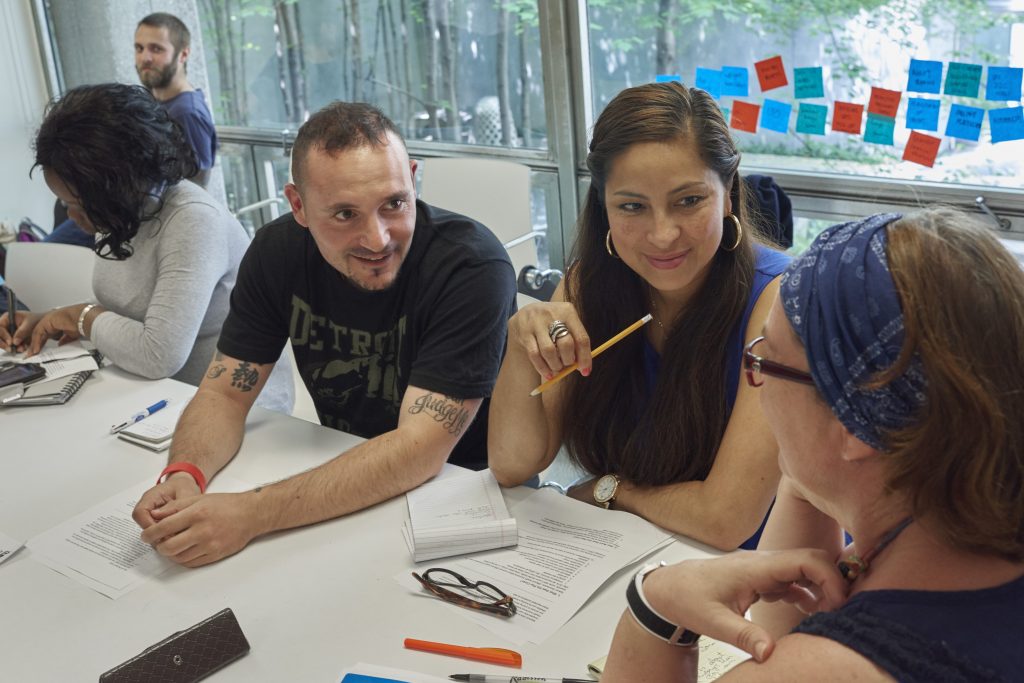
MA TESOL Program Celebrates 10 Years of Innovation and Social Engagement
When The New School set out to create the first fully online teacher training graduate program in the United States, the university faced numerous questions.
How could teaching techniques be illustrated online? How could teachers in training be observed? And how could the online platform match and, if possible, surpass the rich interaction of face to face classes?
“We wanted to foster a community of learners who could develop a community of practice that not only embraced best practices in the field but also challenged them,” recalls Lesley Painter-Farrell, a New School faculty member who helped launch the program.
The following year, The New School accomplished that goal with the creation of the Masters in Teaching English to Speakers of Other Languages (MA TESOL). Celebrating its 10th anniversary this year, the program has embraced the university’s tradition of innovation and social engagement. Students, alumni, faculty members, and special guests recently marked the milestone with a celebration at The New School.
As MA TESOL developed, what was first assumed to be a challenge — the online setting of the class — turned out to be a benefit. Because classes were not restricted to a physical classroom space, students from all over the world could interact, creating the opportunity for the exchange of rich and diverse perspectives. Additionally, students were given time to process new concepts over days of discussion rather than within the restrictions of a restricted time frames of a face-to-face class.
This approach advanced a core tenet of the program: to ensure that students are aware not only of pedagogy and linguistics, but also that they are able to adopt a social, cultural, and political perspective to the field of English language teaching.
“We had entered new territory and a lot of people in the field of English language teaching were watching,” Painter-Farrell recalls. “What occurred surpassed our expectations and estimations of the online environment. The online platform proved to be an excellent space to facilitate rich and fruitful interaction between classmates and professors.”
Graduates of the MA TESOL praised the program and the experience it afforded.
“The international focus of the program set the course for my career,” says Caryn Davis, MA TESOL ‘10, who mentors a staff of non-native speaking English teachers at a Manhattan language school for international students and teaches academic English to immigrants at the City University of New York in Brooklyn. “Every week, I enrich the lives of these students and teachers in the same ways the students and teachers at the New School enriched mine.”
As MA TESOL moves forward, it continues to follow The New School’s tradition of encouraging innovation and social engagement in the field of English Language Teaching. Evidence of this can be seen in the MA TESOL Outreach program, in which students teach free English classes to underserved immigrants, and the Student Speaker Series, which examines language through a social justice lens. Moreover, at the recent TESOL (Teaching English to Speakers or Other Languages) international conference, more than 25 MA TESOL alumni gave presentations.
A decade since its creation, MA TESOL has not only surpassed many of the logistical challenges that first faced the program, but also challenged the entire field of English language teaching.
“When we began the MATESOL, the advertising materials stated that the program aimed to raise the standards of the field — heady goals,” Painter-Farrell says. “But 10 years on I realize we have done just that. There are graduates all over the world, faculty, program leaders, curriculum designers, Fulbright scholars, researchers and authors. As we go forward, I am excited to see how else we influence this dynamic and ever-evolving field.”